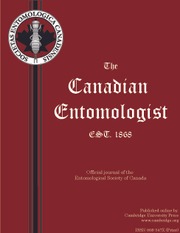Article contents
SUITABILITY OF ANAITIS PLAGIATA (GEOMETRIDAE) FOR BIOCONTROL OF HYPERICUM PERFORATUM IN DRY GRASSLAND OF BRITISH COLUMBIA
Published online by Cambridge University Press: 31 May 2012
Abstract
The suitability of a European moth Anaitis plagiata (L.) for the biological control of the weed Hypericum perforatum L. in British Columbia is evaluated. It is concluded that the introduction of the moth is justified as it offers prospects of reducing the weed density without damage to economic plants. A. plagiata is preadapted to dry habitats and ecologically restricted to them. Its high fecundity and two generations a year should enable it to reach an effective population level rapidly and the early spring feeding by the overwintered larvae should damage the weed when it is most vulnerable. It was shown by feeding tests that the larvae are restricted to plants in the genus Hypericum. Furthermore, all the known hosts of the genus Anaitis are restricted to the genus Hypericum which indicates that the insect-host plant relationship is an old and highly stable one. Larval feeding was found to be partly in response to a chemical compound present in the cuticular waxes of the host plant.
- Type
- Articles
- Information
- Copyright
- Copyright © Entomological Society of Canada 1967
References
- 9
- Cited by


